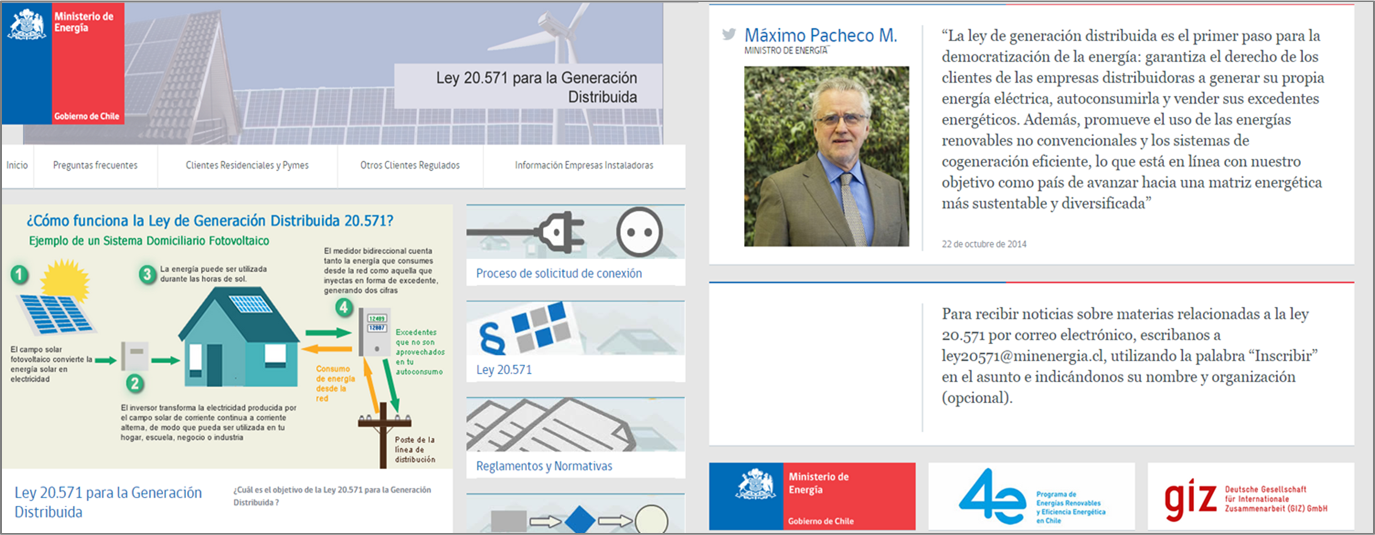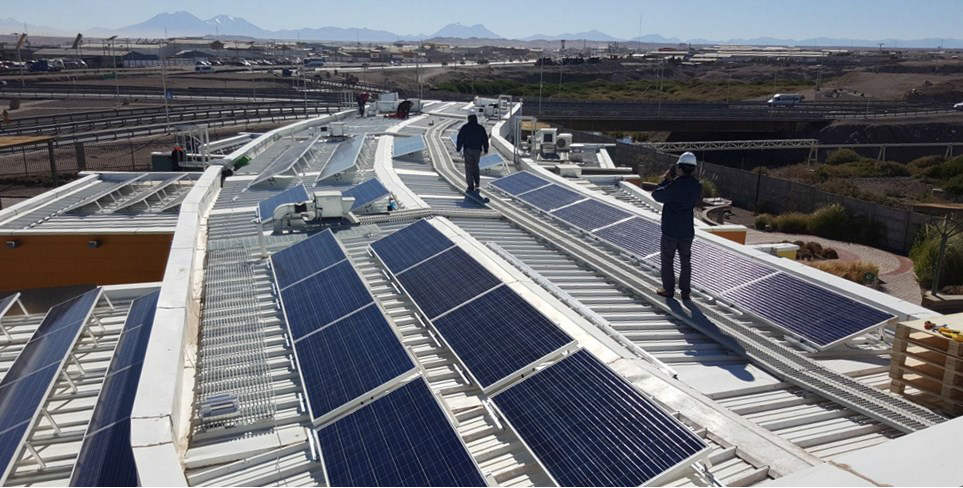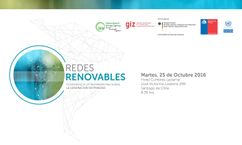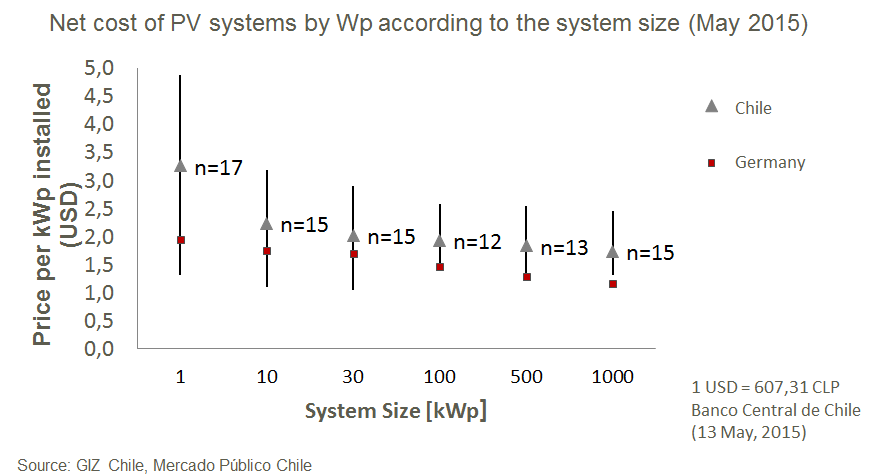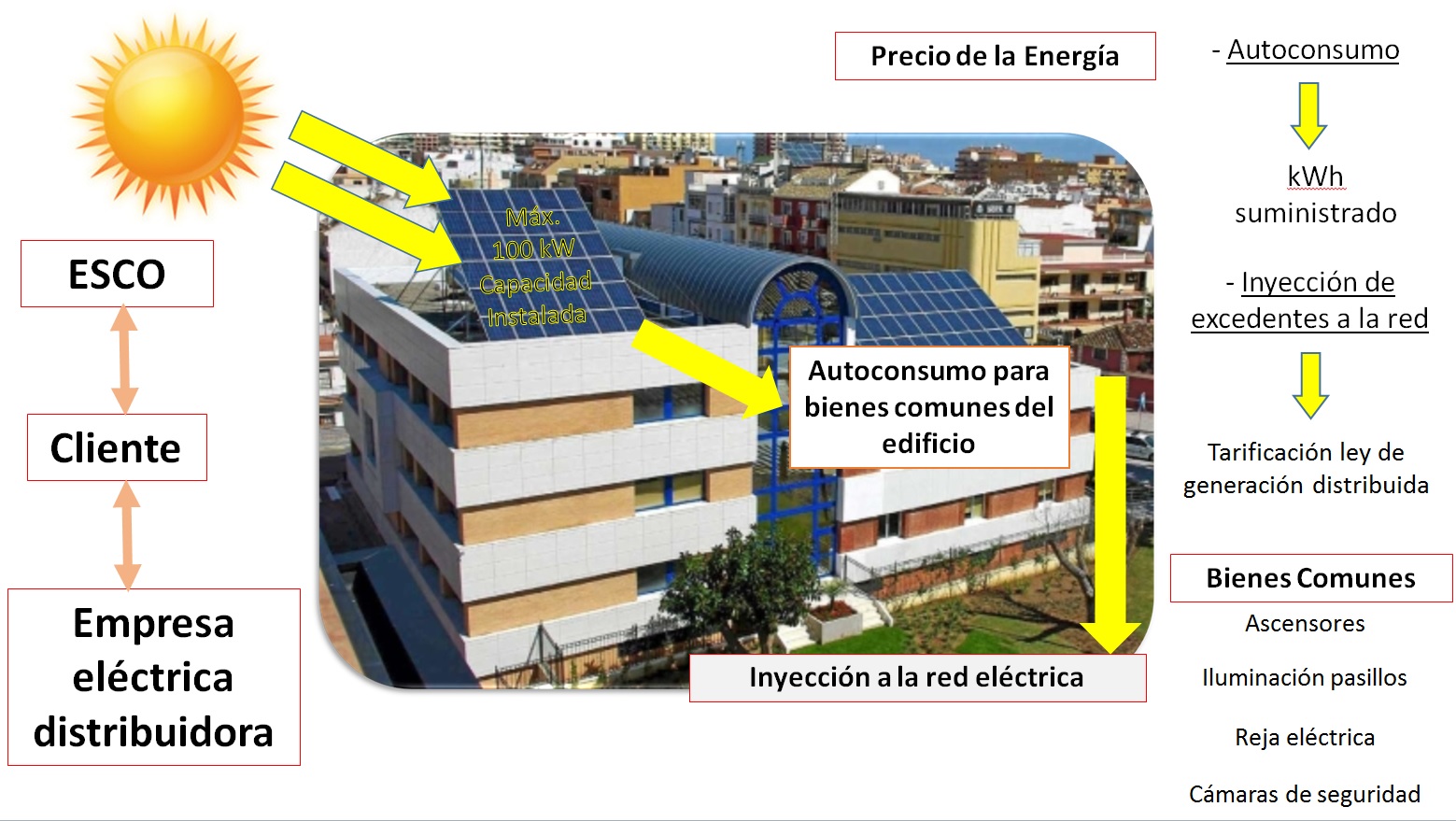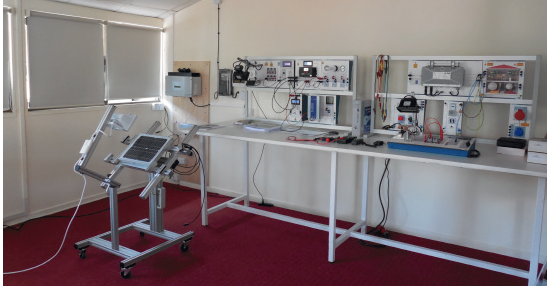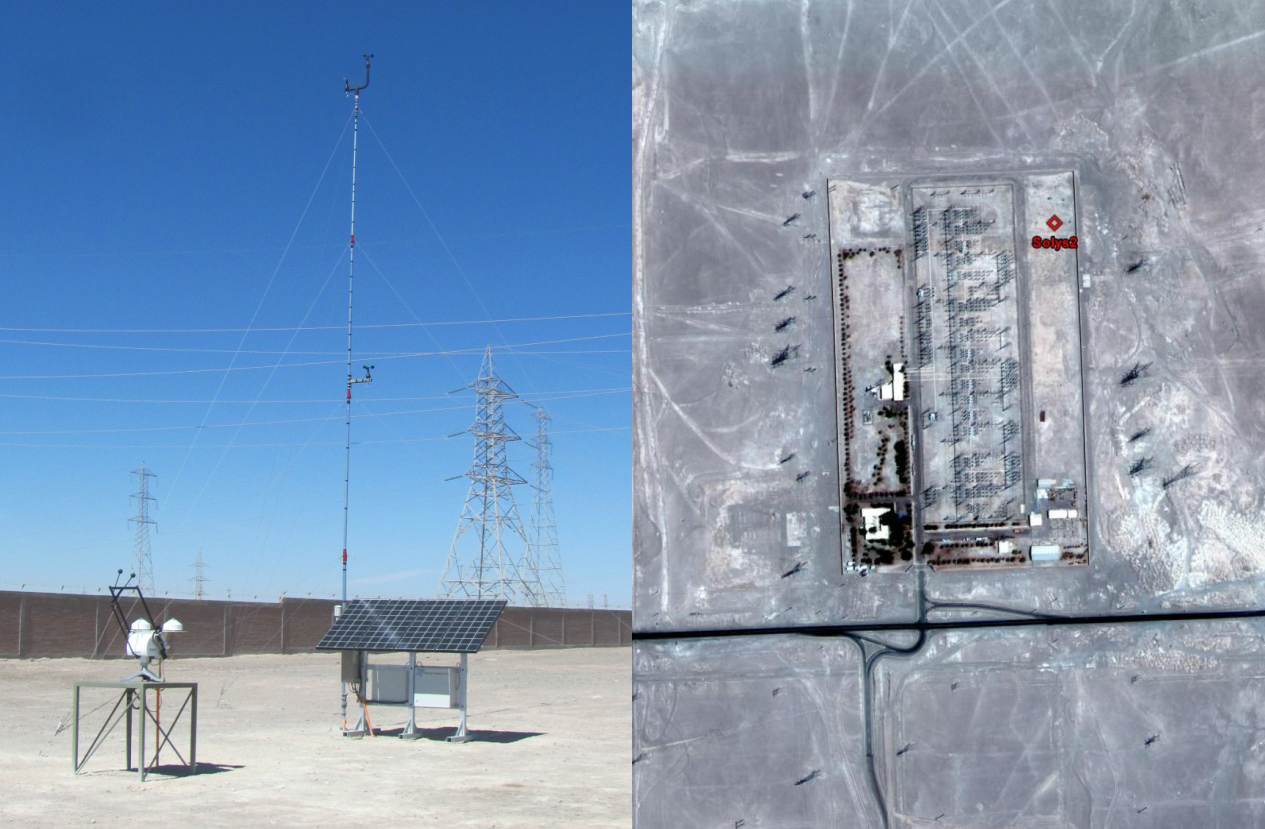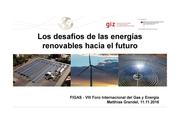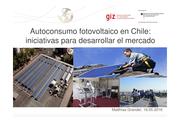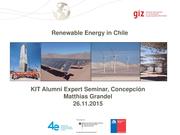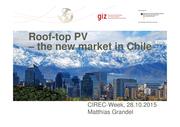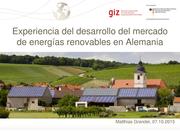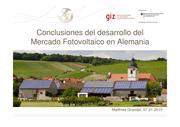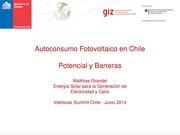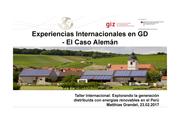Solar Energy for Electricity and Heat in Chile
Overview
|
Project |
Solar energy for electricity and heat |
|
Commissioned by |
German Federal Ministry for the Environment, Nature Conservation, Building and Nuclear Safety (BMUB) |
|
Country |
Chile |
|
Lead executing agency |
Ministerio de Energía (Ministry of Energy) |
|
Overall term |
2012 – 2017 |
Context
Chile is enjoying a strong economic growth and the power consumption has doubled every 10 years. Construction of additional conventional thermal power plants and increasing consumption of fossil fuels such as coal are resulting in an increase in greenhouse gas (GHG) emissions. With Chile’s accession to the Organization for Economic Co-operation and Development (OECD), the country made a commitment to mitigating climate change and announced ambitious GHG reduction goals. The objective of Chile's energy policy is to ensure security of supply at competitive costs considering climate protection criteria. In this endeavor, renewable energy resources are becoming more and more important. In 2008, the quota law for renewables established a basis for their integration into the market. Due to their optimal solar irradiation conditions, Chile has one of the highest solar potentials worldwide. Now, the Chilean Government additionally wishes to promote the use of solar energy.
In order to encourage market development, the Ministry of Energy has implemented the following measures:
- Tax incentives for the use of solar thermal water-heating (solar thermal energy)
- The Net-Billing,law for feeding in self-generated electricity from systems delivering up to 100 kW
A start has been made in setting up large scale solar power plants in the north of the country, and the electricity generated through solar energy is competitive compared to the conventional energy generation. Nevertheless, various obstacles, especially for small size installations, have prevented a wider use of solar energy. There are only a few suppliers of PV systems for captive use, and there is also a shortage of qualified specialists. Consequently, the prices for solar installation are still at a high level in comparison with the international market, and the technologies used are not attractive for financial institutions. Banks are cautious when it comes to financing small sized projects and self-consumption system, and there are gaps in the regulatory framework.
Approach
The project “Solar energy for the production of electricity and heat” from the Deutsche Gesellschaft für Internationale Zusammenarbeit(GIZ) GmbH, supports the Chilean government under the framework of the International Initiative for Climate Protection (IKI), in achieving their goals of reducing Green House Gases (GHG), opening profitable market segments for the use of solar energy.
The first stage involved an improvement of the framework conditions for the installation of such a technology. Innovative business models are being developed for each sector, and installers are being trained in order to strengthen local skills and thus, foster new markets for the use of climate-friendly solar energy technology. The work of the project is located at the intersection between the solar market and energy policy.
Market opportunities for self-supply solutions
The project allows the identification of economic sectors and scopes of application in which the captive use of solar power and solar heat for self-supply is economically viable. The insights gained within the scope of project activities are continually factored into the policy advice for use in developing an enabling environment, and are intensified by means of fact-finding tours, workshops and the exchange of information and experience in a national and international level between solar sector actors.
Results
Regulatory Framework
Support to the Ministry for the Completion of the Regulatory Framework and Dissemination of the Law for Distributed Generation (Net-Billing / Metering)
The project participated in the completion of the regulations and technical standards for the distributed generation law. Furthermore, it yielded valuable impetus in the diffusion through a video and a website explaining the operation and administrative processes for connecting an electrical generator under the distributed generation law.
Download documents:
- Gesetz 20.571 zum Net-Metering/Billing, 2015 (German)
- Übersetzung der FAQ der Website des chilenischen Energieministeriums, 2015 (German)
- Law 20.571 FAQ Translation from Chilean Ministry of Energy web site (English)
Support to the Ministry of Energy in the Public Roofs Program
The project Solar energy for the production of electricity and heat has been supporting the Public Roofs Program, both in its creation and implementation. The objectives of the project are to introduce photovoltaic plants on public property and at the same time boost the maturity of the national PV market. The Chilean Ministry of Energy in conjunction with the GIZ developed guides and manuals of best practices in maintenance and installation of photovoltaic systems, thus promoting the use photovoltaic energy throughout the country.
Further information:
► Programa Techos Solares Públicos
Regional Conference "Redes Renovables" on Distributed Generation in Latin America hosted by IEA, GIZ, CEPAL, Chilean Ministry of Energy (Santiago de Chile - October 25th, 2016)
On October 25th, 2016 the regional conference "Redes Renovables" was held in Santiago de Chile. The event was co-organized by the IEA, GIZ, CEPAL and the Chilean Ministry of Energy.
This year's main topic was the state of distributed generation in Latin America with a special emphasis on regulatory issues. Several national and international high level speakers gave their perspective on the matter.
Click on "Futher Information" to view and download the presentations.
Manual for Fire Prevention in PV Power Plants
The document of november 2015 is about the evaluation of fire risk in photovoltaic systems and creation of security concepts to minimize risk. The contents of the manual are:
- The evaluation of fire risk in PV power plants, as well in case of action of third parties as fire risk occurring within the PV power plant.
- Evaluation of risks for fire fighters in case of fire fighting and developing and demonstrating strategies to minimize risks.
- Evaluation of options to minimize fire potential within the PV power plant.
- Derivation of recommendations concerning components and system design, material and quality assurance concerning production, installation and maintenance.
Download document:
►Manual for fire prevention in PV power plants
Market Development
Price Index of Photovoltaic Systems
Since 2014 GIZ is conducting a price index of the PV systems ranging from 1 kW to 100 kW in capacity. This price index has been updated every six months and compares the costs of PV installations in Chile with those of the mature market of Germany. The latest version of these indexes is from November 2016.
Cost Index for Cleaning of PV Panels
Different companies were asked to submit a proposal for the cleaning of PV panels in Chile. The following document was elaborated in October 2016 and contains the results of that tender in summarized form.
Download document:
Manuals and guidelines
Under the framework of the Public Roofs Program, GIZ has elaborated several studies, manuals and guidelines as part of the project solar energy for electricity and heat. Click on "Manuals and documents" too see and download these documents.
ESCO Guide and Standard Contract for PV Self-supply
The ESCO guide was published in 2016 and analyzes different types of business models of an Energy Service Company (ESCO) that allow an ESCO to install and operate a photovoltaic plant and supply the generated power to his customer.
Click "Further information" to view and download this guide, a factsheet of the ESCO business model, a standart contract format and more.
Solar Laboratories for Technical Training
The project has set up solar laboratories at six vocational training institutions and universities in the country to promote sufficient well-trained installers of solar photovoltaic plants. The objective is to encourage in higher education institutions, the training of professionals and technicians to meet the demand for specialists in the design, selection, installation and maintenance of the photovoltaic plants. It is expected to have about 50 technicians-professionals trained annually in these laboratories.
Solar Measurements
The project continued the measurement campaign initiated in 2008 to determine the solar potential in northern Chile and made DNI measurements (Direct Normal Irradiation) in the Station "Crucero II" using measuring instruments of high precision.
Download document:
Expected impacts:
The use of solar energy can partly replace electricity generation in conventional power plants, which contributes to achieving the goals of reducing emissions and energy dependence in Chile. A more sustainable and secure energy mix contributes to improving the international competitiveness of the Chilean economy.
Archive
Between 2013 and 2017 a number of research and feasibility studies for photovoltaics-projects have been conducted. The following documents should be analyzed and read within the framework and context of their elaboration date. During the last years, there has been an evolution of prices and the Regulatory Framework in the Chilean solar market. Therefore, these documents are not necessarily valid in the current market conditions.
Download documents:
Further Information
Additional diffusion material developed through the program:
Information about the current energy market and mixture in Chile:
Presentations and conference contributions:


